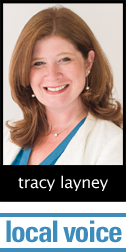
We all walk our own paths
— why I chose the Jewish one
Why have I chosen to become Jewish? I’ve heard this question many times over the past five years as I moved through the conversion process with Rabbi Michael Lezak at Congregation Rodef Sholom in San Rafael. A series of small (but ever growing) guideposts, popping up early and unexpectedly during my life, have brought me to the mikvah.
At the heart of Judaism is the notion of wrestling with and struggling with God. Since beginning the formal conversion process, I have wrestled with things I am sure most converts consider: How will my mother feel about this? Will I ever feel Jewish given that a significant portion of the American Jewish experience is rooted in a cultural history that is not mine? Am I willing to become the subject of anti-Semitism — and worse, expose my son to this hate?
I am happy to say that my mother is supportive of my journey. I also know that it is our responsibility as Jews to fight hatred and injustice wherever they appear. As for cultural identity, I have met so many different types of Jews that I now realize that a shared cultural heritage is not the only story — and in many ways, I do have a shared cultural experience. My ancestors were poor immigrants who escaped famine and persecution in Ireland. As they made their way to America, they often faced discrimination due to their ethnicity and religion. So, while we each walk our own path, I have come to understand that even though I started somewhere else, I am walking the same path that started with Abraham and Sarah so long ago.
So why, like Ruth, am I becoming part of the Jewish people? I am becoming a Jew because Judaism is a religion deeply rooted in family and community. When I light candles on Shabbat or bake my own challah, I feel deeply connected to those around me who are saying the blessings with me, and to all who have come before me.
I love the fact that while Judaism accounts for private moments of prayer, it also mandates community in times when people need it most — such as requiring
a minyan to say the Mourner’s Kaddish.
I am becoming a Jew because Judaism is less about dogma and more about action. What we do in this world matters. We are commanded to repair the world — tikkun olam — and to offer tzedakah as a form of social justice and not just charity.
I am becoming a Jew because Judaism is a religion of learning (and debating, and wrestling with) and not just blind belief. We are commanded to study Torah — to wrestle with its contents. Learning in all forms is a blessing, and we must commit our lives to its pursuit.
I am becoming a Jew because I have become a lover of Israel. I have learned that I can disagree with its politics (as I often disagree with America’s politics), but I can love what Israel stands for just as I love what America stands for.
I am becoming a Jew because of Judaism’s commitment to finding the holy in the ordinary — to sanctifying our lives with meaning every day. I love Shabbat and the Jewish holidays and the lessons they give us. Shabbat gives us a palace in time each week; Rosh Hashanah and Yom Kippur demand that we reckon with the year behind us and the one in front of us; Pesach reminds us of the blessings and responsibilities that freedom brings; Purim reminds us to laugh; Hanukkah brings light and hope to the darkest days.
I am becoming a Jew because I want to give this gift to my son, Noah, now 10 — the brightest light in my life — so that he too becomes a descendant of Abraham and Sarah. I want to give him the gift of mitzvot as a path to find meaning in life and to know that he is connected to something much bigger and much more enduring that himself.
I went to the mikvah last month for all of these reasons — and because of guideposts large and small that brought me there. I emerged from the mikvah as Sarah. I chose this name to honor my heritage, as Sarah is my mother’s name and my great-grandmother’s name and her grandmother’s name before her. Sarah was also the first Jewish woman and so a convert herself who accepted the covenant with God.
I am also excited that Noah entered the mikvah as well. He has become Noah Asher. Asher means blessing and happiness, and Noah has been such a deep blessing to us, bringing us happiness since the day he was born.
Like Sarah and Ruth and so many others before me, I am excited to make the Jewish people my people — to walk the path with Abraham and Sarah, to join the tribe of people who have been instrumental in shaping our world.
Tracy Layney is a human resources executive who lives in Marin County with her husband and 10-year-old son.
You can see this article on the J-weekly site here.
 RSS Feed
RSS Feed